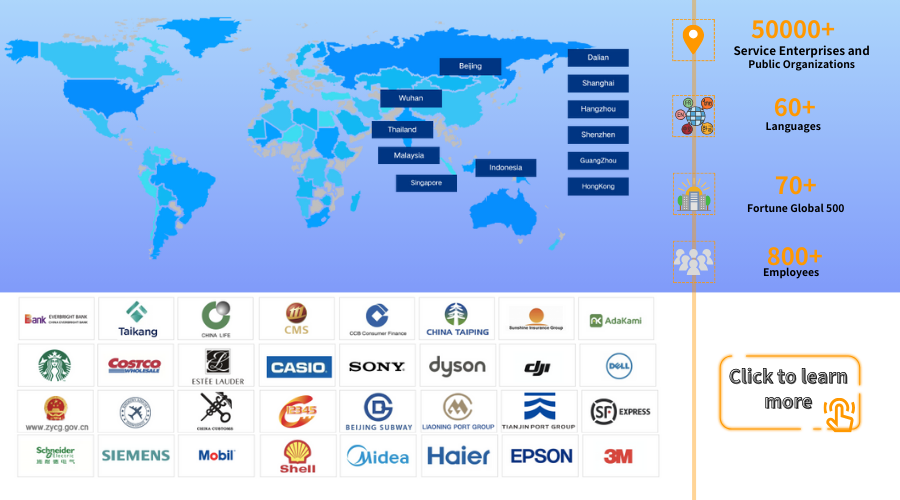Intelligent Customer Service System: A Key Implementation Scenario for Entering the Era of Intelligent Agents
文章摘要:In the context of economic globalization, the rapid advancement of artificial intelligence technology has ushered us into the era of intelligent agents. With their powerful autonomous learning and interactive decision-making capabilities, intelligent agents are reshaping business models across various industries. As a frontier application of AI technology, intelligent customer service systems have become a critical implementation scenario in the era of intelligent agents, profoundly transforming the way businesses interact with customers.
In the context of economic globalization, the rapid advancement of artificial intelligence technology has ushered us into the era of intelligent agents. With their powerful autonomous learning and interactive decision-making capabilities, intelligent agents are reshaping business models across various industries. As a frontier application of AI technology, intelligent customer service systems have become a critical implementation scenario in the era of intelligent agents, profoundly transforming the way businesses interact with customers.
1. Development Background and Evolution of Intelligent Customer Service Systems
Traditional customer service models rely heavily on human agents, which not only incur high labor costs but also suffer from slow response times and inconsistent service standards when handling massive volumes of customer inquiries. With the widespread adoption of the internet, enterprise customer bases have grown exponentially, and customer inquiry channels have become increasingly diversified, making traditional customer service models increasingly inadequate. Against this backdrop, intelligent customer service systems emerged.
Early intelligent customer service systems were largely based on keyword matching, providing simple responses to customer queries through pre-defined rule sets. These systems offered rigid interaction experiences and had limited problem-solving capabilities. With continuous breakthroughs in artificial intelligence technologies such as natural language processing (NLP) and machine learning, intelligent customer service systems have evolved toward greater intelligence and human-like interaction. Today, these systems can understand the intent behind customer queries, engage in multi-turn conversations, and autonomously learn to optimize response strategies, demonstrating robust vitality in the era of intelligent agents.
2. Key Technological Supports for Intelligent Customer Service Systems in the Era of Intelligent Agents
(1) Natural Language Processing Technology
Natural language processing is the core technology enabling natural human-machine interaction in intelligent customer service systems. It encompasses various aspects, including language understanding, semantic analysis, and text generation. Through operations such as word segmentation, part-of-speech tagging, and syntactic analysis of customer input, intelligent customer service systems can accurately comprehend customer intent. For example, when a customer asks, "What should I do if my phone charges slowly?", the system can not only identify keywords but also understand that the customer is seeking a solution for charging issues, thereby providing relevant advice.
(2) Machine Learning and Deep Learning
Machine learning algorithms empower intelligent customer service systems with self-learning and optimization capabilities. By learning from vast amounts of historical customer service data, these systems continuously adjust model parameters to improve response accuracy and relevance. Deep learning models, such as Recurrent Neural Networks (RNN) and their variants (e.g., Long Short-Term Memory networks (LSTM)) and Transformer, excel in handling complex scenarios like long texts and multi-turn dialogues. Pre-trained language models based on Transformer can quickly adapt to new business scenarios with minimal annotated data, significantly enhancing the generalization capabilities of intelligent customer service systems.
(3) Knowledge Graph Technology
Knowledge graphs describe entities and their relationships in the objective world in a structured manner, providing intelligent customer service systems with rich background knowledge. When customers inquire about highly specialized topics, the system can quickly retrieve relevant knowledge from the knowledge graph to generate accurate responses. For instance, in the financial sector, a knowledge graph can clearly illustrate the features of various financial products, methods for calculating returns, and relationships between different products, enabling the customer service system to provide professional and comprehensive answers.
Intelligent Customer Service Systems: A Critical Implementation Scenario in the Era of Intelligent Agents
3. Key Implementation Scenarios for Intelligent Customer Service Systems in the Era of Intelligent Agents
(1) Customer Service in the E-commerce Industry
In the e-commerce industry, intelligent customer service systems handle the critical task of managing massive volumes of pre-sales inquiries and after-sales issues. During pre-sales, they can quickly respond to customer queries about product information and promotions, recommend products that meet customer needs, and enhance the shopping experience and conversion rates. For after-sales support, intelligent customer service systems can automatically process return and exchange requests, track logistics, and address customer concerns promptly, thereby improving customer satisfaction. During shopping events like "Double Eleven," these systems efficiently handle several times the usual volume of inquiries, ensuring stable operation of e-commerce platform customer services.
(2) Customer Service in the Financial Sector
The financial industry demands extremely high levels of professionalism and security in customer service. Intelligent customer service systems can provide 24/7 financial consulting services, answering customer questions about wealth management products, loan policies, account operations, and more. Simultaneously, features such as identity verification and risk assessment ensure customer information security. For example, a bank's intelligent customer service system can recommend suitable wealth management products based on a customer's asset status and risk preferences and alert customers to potential risks during large transfers, safeguarding their funds.
(3) Customer Service in the Telecommunications Industry
The telecommunications industry serves a vast customer base with diverse service types. Intelligent customer service systems can help customers quickly check data usage, manage service changes, and resolve network issues. By integrating with telecom operators' business systems, these systems automate service processes. For instance, when a customer reports poor network signal, the intelligent customer service system can automatically collect location information, identify the cause of the issue, and coordinate with technicians for on-site repairs, significantly improving service efficiency.
4. Development Trends of Intelligent Customer Service Systems in the Era of Intelligent Agents
(1) Deep Integration with Multimodal Interaction
In the future, intelligent customer service systems will no longer be limited to text-based interactions but will deeply integrate with multimodal interaction methods such as voice, images, and gestures. Customers will be able to communicate with these systems through voice commands, video calls, and other means. The systems will also be able to more accurately understand customer emotions and needs based on expressions, tone, and other cues, providing more empathetic services.
(2) Industry-Specific Customization
As various industries demand more refined intelligent customer service solutions, generic systems will become inadequate. In the future, intelligent customer service systems will undergo deep customization to align with the business characteristics, knowledge systems, and service processes of different industries. For example, intelligent customer service systems in the healthcare industry will possess professional medical knowledge to assist patients with preliminary consultations, appointment scheduling, and other services.
(3) Comprehensive Integration with Enterprise Business Systems
Intelligent customer service systems will further integrate comprehensively with enterprise business systems such as ERP and CRM, enabling real-time data sharing and seamless business process alignment. By consolidating customer historical transaction data and service records, these systems can provide more personalized and precise services while offering robust support for enterprise decision-making.
Udesk Intelligent Customer Service System by Workfine Technology integrates cloud call center, online customer service, and work order system into a single platform. It connects with over 20 communication channels worldwide, seamlessly linking your global customers. By establishing connections with customers through multiple channels, it enhances sales performance, improves service quality, and delivers exceptional customer experiences. Real-time insights into customer intentions make lead acquisition and conversion easier than ever!
The article is original by Udesk, and when reprinted, the source must be indicated:https://my.udeskglobal.com/blog/intelligent-customer-service-system-a-key-implementation-scenario-for-entering-the-era-of-intelligent-agents.html
Customer Service System AdvantagesCustomer Service System FunctionsIntelligent customer service system

 Customer Service& Support Blog
Customer Service& Support Blog


